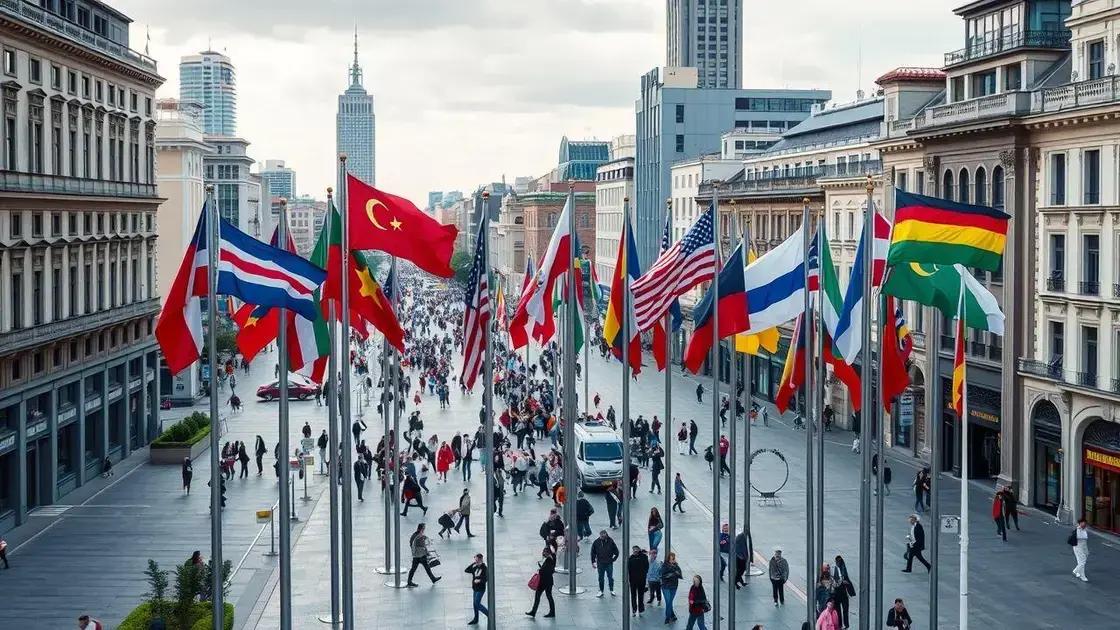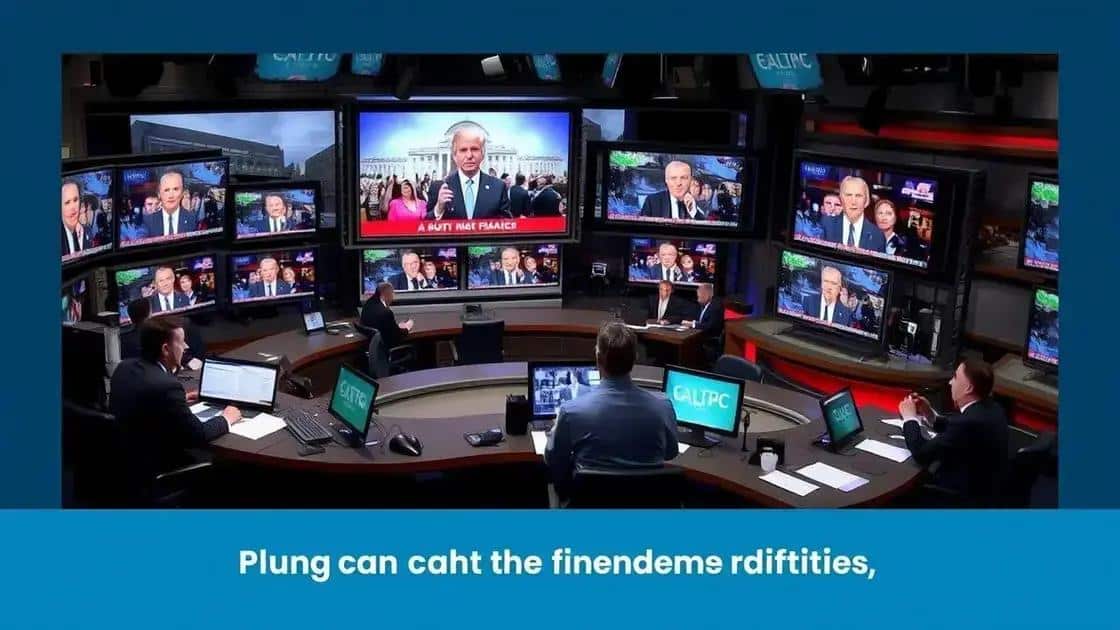Latest global political news: what you need to know

Future trends in international diplomacy include the rise of digital diplomacy, increased multilateral cooperation, and the influence of emerging powers, highlighting the importance of collaboration in addressing global challenges.
Latest global political news impacts our daily lives in ways we often overlook. Have you ever wondered how these events shape your future? In this article, we’ll dive into the current landscape of international politics and what it means for you.
Major developments in international relations
In recent years, there have been significant major developments in international relations that affect every corner of the globe. As the world becomes more interconnected, understanding these changes is vital.
Shifting Power Dynamics
Countries are realigning their foreign policies, leading to a shift in global power dynamics. For instance, nations like China and India are emerging as key players on the world stage. This competition among superpowers influences trade, defense, and diplomatic strategies.
International Agreements
One noticeable trend is the formation of international agreements addressing global issues such as climate change and trade. These agreements are essential to foster cooperative relationships among nations. Important examples are:
- The Paris Agreement aimed at combating climate change.
- The North American Trade Agreement facilitating trade between the U.S., Canada, and Mexico.
- The Iran Nuclear Deal focusing on nuclear non-proliferation.
These agreements reflect a growing recognition that many challenges require collaborative solutions.
Additionally, regional alliances are becoming more pronounced. For example, the European Union plays a crucial role in unifying its member states, facilitating trade, and promoting peace. This collaboration often leads to shared policies on immigration and security that strengthen the collective influence of smaller nations.
In contrast, tensions between countries can arise from differing interests. Recent conflicts involving territorial disputes and resource allocations highlight the need for effective diplomacy. These situations remind us how quickly relationships can shift, making the role of diplomats more important than ever.
The Role of Technology
Another factor impacting international relations is the rise of technology. The digital age has transformed communication and information sharing. The internet enables rapid dissemination of information, influencing public opinion worldwide. Thus, governments must adapt to the new landscape, using technology as a tool for diplomacy or as a means of warfare.
Staying informed about these significant developments is crucial for understanding the future of international politics. Being aware of how major developments shape global affairs can empower individuals and nations to navigate the complexities of our world.
Impact of elections on global politics
The impact of elections on global politics is profound, as they not only shape the governance of a nation but also alter international relations. Each election cycle brings changes that can ripple far beyond borders.
Shifting Alliances
Election outcomes often change alliances among countries. When new leaders are elected, their foreign policies may differ significantly from their predecessors. For example, leaders who prioritize climate change might strengthen ties with nations that share similar values, while those focusing on economic growth could emphasize trade agreements.
Voter Influence on Foreign Policy
The public’s vote reflects their stance on various issues, impacting how countries interact on the global stage. Recent elections show a trend where citizens demand more accountability in foreign policies. This has led to:
- Increased scrutiny of military interventions.
- Calls for more humanitarian aid in conflict areas.
- Support for international organizations to tackle global challenges.
Such demands indicate that voters are becoming more aware of how local policies affect international dynamics.
The emergence of populist movements also highlights a change in political discourse. Leaders often exploit nationalistic sentiments during elections, which can lead to isolationist policies. This shift can create tension between countries, sometimes resulting in trade wars or withdrawal from international agreements.
The Role of Media
Another significant factor is the role of media in shaping election narratives. Especially in today’s digital age, social media platforms can amplify political messages. This not only influences domestic voters but also affects how foreign governments perceive a country. Negative portrayals can lead to strained relations, while positive exposure can open doors for collaboration.
Understanding the impact of elections on global politics is essential for recognizing broader trends. As elections continue to evolve, so too will their implications for international relations, necessitating ongoing analysis and engagement from all global citizens.
The role of media in shaping political narratives

The role of media in shaping political narratives has never been more significant. In today’s digital age, media outlets influence public opinion and can sway political views with their coverage.
Media as the Fourth Estate
Traditionally, the media is known as the fourth estate, acting as a watchdog over government actions. It is responsible for informing the public about political developments. Without media scrutiny, politicians might not feel accountable for their actions. This oversight is essential for a healthy democracy.
Types of Media Influence
Media influences can be categorized in several ways. Understanding these can help clarify how political narratives are shaped. These include:
- News Coverage: How events are reported can highlight specific political agendas.
- Commentary: Opinion pieces can sway public perception by offering specific viewpoints.
- Social Media: Platforms like Twitter and Facebook allow for rapid information exchange, impacting how news spreads.
Each type of media plays a unique role in shaping public discourse. For instance, in many elections, social media becomes a battleground for ideas, where misinformation can spread quickly.
Moreover, the media’s choice of language and framing can also affect political narratives. For example, labeling a policy as “reform” rather than “cut” can create a positive perception, regardless of the actual impacts. Such framing can define the success or failure of policies in the eyes of the public.
Changing Political Landscapes
As media evolves, so do political landscapes. Awareness of the role of media in shaping political narratives has increased among audiences. This shift encourages critical thinking, as people start to question the sources of their information. An informed electorate is crucial for democracy to thrive.
Consequently, politicians are adapting their strategies, recognizing the media’s power in influencing voter behavior. They often craft messages to align with prevailing media narratives, hoping to galvanize support based on how issues are presented.
Challenges facing global leaders today
Global leaders today encounter numerous challenges that test their abilities and influence. These challenges stem from a complex web of social, political, and environmental issues that require careful navigation.
Climate Change and Sustainability
One of the most pressing challenges is climate change. Leaders must find ways to implement sustainable practices while balancing economic growth. Countries are increasingly facing natural disasters, which impact infrastructure and livelihoods. This situation compels leaders to:
- Promote renewable energy sources.
- Establish international agreements on emissions.
- Encourage community involvement in conservation efforts.
Addressing climate change is not just an environmental issue; it is crucial for global security and economic stability.
Economic Inequality
Another significant challenge is economic inequality. In many regions, the gap between the rich and the poor continues to widen, leading to social unrest. Leaders face pressure to create fair policies that promote social justice and equitable distribution of resources.
As they work to address these disparities, they often need to consider:
- Implementing minimum wage laws.
- Enhancing access to education and healthcare.
- Creating job opportunities in underserved communities.
By actively addressing economic inequality, leaders can foster healthier societies and promote stability.
Geopolitical Tensions
Additionally, geopolitical tensions pose significant challenges. As nations compete for resources and influence, leaders must navigate complex diplomatic relationships. This competition can lead to conflicts that require delicate handling to prevent escalation.
With the rise of nationalism, leaders are also confronted with the challenge of maintaining international cooperation. Finding common ground in negotiations can be demanding but essential for global peace.
Understanding the challenges facing global leaders today is crucial in a rapidly changing world. These leaders must balance diverse interests while striving to create a safer and more equitable global environment.
Future trends in international diplomacy
Future trends in international diplomacy are evolving rapidly due to technological advancements, changes in global power dynamics, and shifting public expectations. Understanding these trends is crucial for nations looking to navigate the complex landscape of global relations.
The Rise of Digital Diplomacy
One significant trend is the rise of digital diplomacy. Leaders now utilize social media and online platforms to communicate directly with foreign audiences. This approach bypasses traditional media filters, allowing leaders to share their messages in real-time.
As a result, governments can:
- Engage with citizens abroad to foster goodwill.
- Counter misinformation by presenting factual information directly.
- Promote national interests efficiently using targeted campaigns.
Digital tools are reshaping how states engage in diplomatic dialogue, often leading to more interactive and immediate exchanges.
Multilateralism and Global Cooperation
Another trend is a renewed focus on multilateralism. As global challenges such as climate change, pandemics, and migration policies arise, countries recognize that collaboration is essential for effective solutions. International organizations like the United Nations and regional alliances play a pivotal role in facilitating these discussions.
Cooperation among nations highlights the importance of:
- Shared responsibilities in tackling global issues.
- Building alliances to create a united front.
- Negotiating trade agreements that benefit multiple parties.
This multilateral approach fosters stronger relationships and enhances global stability.
Moreover, emerging powers are gaining prominence in international diplomacy. Countries such as India and Brazil are asserting their influence, leading to a more decentralized world order. This shift compels established powers to adapt their strategies and consider new perspectives.
Overall, the landscape of international diplomacy is shifting, reflecting the interconnectivity of the modern world. Recognizing these future trends is vital for leaders aiming to navigate an increasingly complex global arena effectively.
FAQ – Questions about Future Trends in International Diplomacy
What is digital diplomacy?
Digital diplomacy is the use of social media and online platforms by governments to communicate and engage with foreign audiences directly.
How does climate change impact international relations?
Climate change creates challenges that require global cooperation, as countries must work together to address environmental issues and develop sustainable practices.
Why is multilateralism important in diplomacy?
Multilateralism allows countries to collaborate on global challenges, enhancing collective security and fostering stronger international relationships.
How are emerging powers changing global diplomacy?
Emerging powers are gaining influence in international affairs, often leading to a decentralization of power and new perspectives in diplomatic negotiations.






